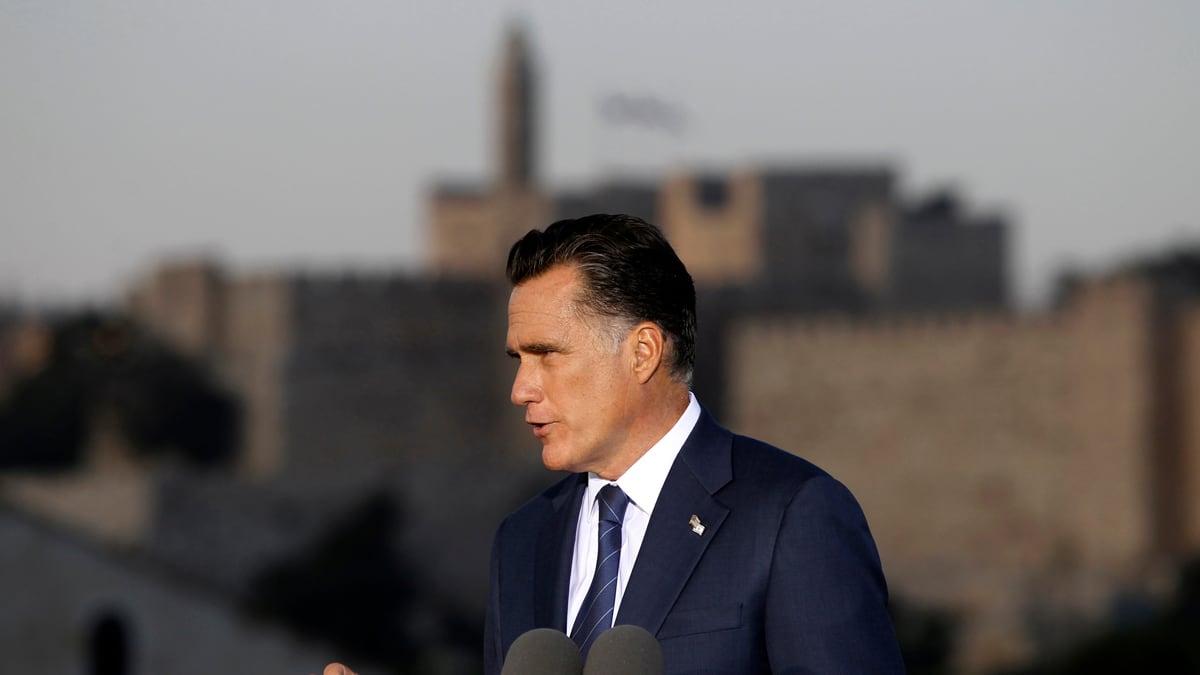To Mitt Romney, it was an innocuous statement about economic success that was meant to boost the egos of several wealthy donors.

"And as I come here and I look out over this city and consider the accomplishments of the people of this nation, I recognize the power of at least culture and a few other things," Romney told a group of about 40 high-rolling U.S. citizens in Jerusalem on Monday morning. He referenced an innovative business climate and the Jewish people’s history of overcoming adversity.
Both, he said, helped explain Israel’s economic dominance over the Palestinian territories of Gaza and the West Bank. According to the World Bank, Israel’s gross domestic product per capita hovers around $31,000. In the Palestinian territories, it’s a significantly lower, around $10,000, depending on several different estimates.
But what seemed like a factual way to lavish praise on wealthy Israelis, seemed to cloak the end of Romney’s Israeli tour in a series of negative news stories, in which both Israelis and Palestinians argued that Romney misunderstood the Israeli-Palestinian conflict.
“It seems to me [Romney] lacks information, knowledge, vision, and understanding of this region and its people,” Saeb Erekat, a senior aide to Palestinian president Mahmoud Abbas, told The Associated Press. “He also lacks knowledge about the Israelis themselves.”
Even Israelis themselves thought the statement could have been more artful and cognizant of the nuances of the age-old conflict. “I might have put it a bit differently,” Zalman Shoval, a former Israeli ambassador to the U.S., told the Daily Beast. “There’s no doubt about Israel’s economic achievement over the years, but I would not compare that to the Palestinian economy because obviously the Palestinian economy operates under different conditions.”
Israel’s unique economic position was detailed in the 2010 book Start-Up Nation, which explained that Israel’s economy, geography and spirit have helped attract entrepreneurs and investors to the country. The book was co-written by Dan Senor, now a top adviser to Romney. But Senor’s book stopped short of critiquing the Palestinian territories. Some top Israeli advocates in the U.S. were hesitant to go on the record critiquing Romney, but expressed discomfort at comparing Israeli’s success at the expense of Palestinians.
Romney’s trip was certainly designed to ingratiate himself with Israeli authorities and, most especially, U.S. voters and donors living abroad. He took a hard line on military action against Iran if the country continues its nuclear development. And he suggested that he supported Israel’s decision to continue settlements in the West Bank, long a source of regional antagonism.
The entire effort was aimed at American Jews, particularly in swing states like Ohio and Florida that have voted more than 75 percent for Democrats since 1988. To win either state, Romney needs to increase his share of those votes, using Israel to show a strong commitment to Israel while highlighting that President Obama has yet to visit the Jewish homeland as president.
In the end, the statement wasn’t toxic for Romney—certainly the offense taken by Palestinian people didn’t equal the senior British officials that Romney alienated late last week when he questioned the country’s readiness for the Olympics and wondered whether Britons were enthusiastic enough to host the international games.
By the time Romney left Israel for Poland on Monday, several Israeli and U.S. officials agreed that the Republican candidate had avoided any deeply embarrassing missteps, signaling that the trip may have been successful to expand Romney’s as more worldly and strong on foreign policy.






